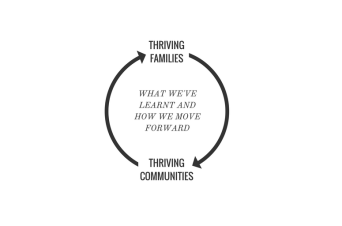Improving outcomes for children by supporting parental relationships
Family relationships
With Department for Work and Pensions
How parents relate to one another has a deep and long lasting impact on their children’s lives – for good or for ill. Every day, local authorities come into contact with families, so how can professionals spot the signs of relationship difficulty and help parents with the support they need?
The Problem
Around 100,000
Children a year in the UK are affected by divorce
50:50
Chance of children living with both parents when they are 16
1/5
Married couples or couples living together are in relationships classed as ‘distressed’
£47.5 billion
Estimated annual public spending on dealing with family breakdown
When children are exposed to certain kinds of conflict between their parents it affects their mental, emotional and physical well-being, when they are young but also in later life. The importance of improving family relationships is clear. What is not clear is who should help, and how?
The ambition of the Local Family Offer programme is twofold: to unpack the answers to these hard questions, and radically disrupt the dominant culture which means that difficulties in relationships are kept behind closed doors.
Early insights from the local authority teams who have piloted new approaches to relationship support through the programme, show they have been convinced by the impact of their work, but this has been no mean feat. To make things work, local authority leaders have been required to make the case for change across different services; encouraging them to embrace new ways of working – with each other and with families – to ensure that impact takes hold.
“Before, if you had asked the question ‘Do you think it’s a good idea for parents to shout and swear at each other in front of their children?’ Most people would have answered ‘No’. But their answer would have been based on ideas of common decency rather than on science. Now we have clear evidence that this is actually damaging to child development. It means we can say, for example, to GPs ‘Doing something about parental conflict is your business as much as tackling smoking in the household is’.” Colin Williams - Senior Specialist
Our Impact
2 years
Working with local authority sites to test new ways of working with services and families
12 local authorities
Taking part in a learning programme to understand what works
Over a period of two years, Innovation Unit and OnePlusOne supported 12 local authorities in their journeys towards developing local systems of support for services that pick up and respond to parental conflict.
To kick start the work we helped local areas looked at the problems within the wider system that could heighten conflict within families. Visual mapping highlighted a range of stressors; like not having a suitable place to live, or financial worries, and showed how relevant services needed to work alongside families to help remove some of these pressures. Croydon’s Gateway model brings together support and advice from across different services, enabling professionals to pick up and more effectively deal with some of the underlying factors that increase parental conflict. The Gateway model empowers professionals to think differently about their role in supporting relationships, and how they can work together through cross-service partnerships to really make a difference.
“We know that lots of parents in Croydon are on low wages and work back to back handing their children over in between. Through the Local Family Offer programme we decided to provide training to frontline staff in Gateway, the single point of access for employment support and housing, budgeting and welfare rights advice. They can now explore relationship issues with parents, signpost them to support and make referrals when appropriate.” Dwynwen Stepien - Head of Early Intervention Support Service
Helping families to manage relationship issues cannot always be someone else’s job. In Dorset, the local authority is building the confidence of frontline staff to identify signs of relationship distress through the Relationships Navigator model. The model develops the workforce to provide the right support for parents, only offering specialist referral when needed. Through the right training, staff have been equipped with a new set of skills and a fresh perspective on how they support families.
“This programme unlocked opportunities we would not have otherwise been able to unlock. The starting point was thinking about who should be around the table and the Innovation Unit coach skillfully facilitated the commitment of partners to create a shared offer.” Patrick Myers - Assistant Director Design and Development Children’s Services
Through the Local Family Offer programme we’ve learned that, in order for real change to stick and become embedded into practice, all staff across services must continue to be incentivised to help tackle relationship conflict. This means the weight of responsibility should be shared across teams, because without this support, the work becomes too hard. Croydon are currently working on an updated ‘basket of indicators’ which will clearly identify a shared set of outcomes to create an equal vision and purpose for change.
Achieving long lasting impact for children and families will require continued work and commitment from all local authorities. We are keen to see more shared learning between system leaders, service managers and frontline practitioners. Our co-designed Resource Pack for the Local Family Offer provides inspiration, shared learning and practical tools for professionals, organisations and localities who believe that investing in supporting relationships between parents is fundamental to improving outcomes for children.
Access all the materials developed from the Local Family Offer programme:
Parental conflict: the impact on children – Case for change
Creating a Local Family Offer – Opportunity assessment tool
Creating a Local Family Offer – Lessons from Local Authority Pioneers
Creating a Local Family Offer – Lessons from Local Authority Pioneers – Appendix


